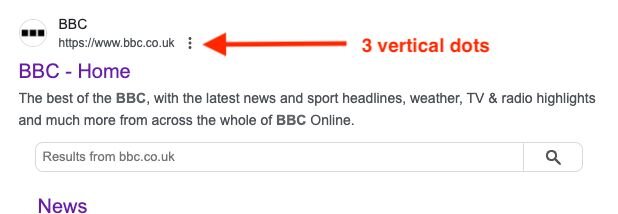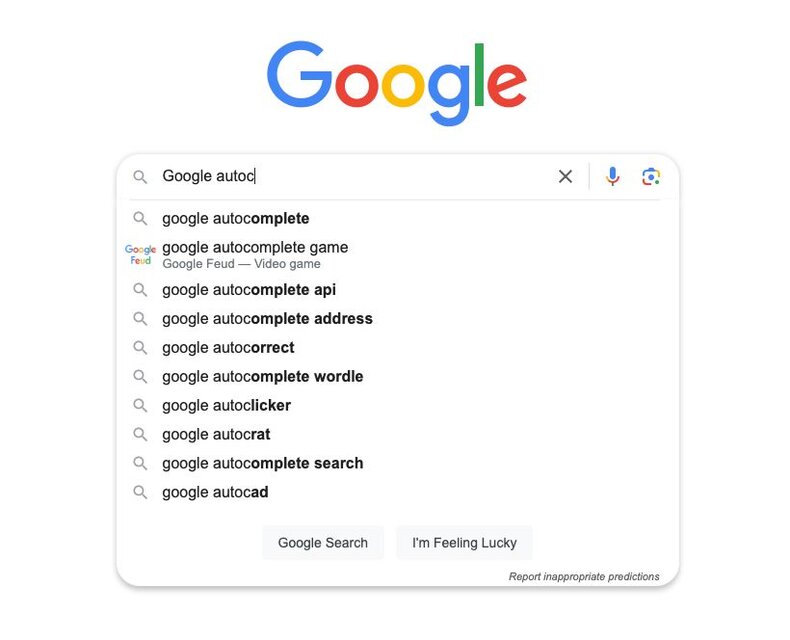A | B | C | D | E | F | G | H | I | J | K | L | M | N | O | P | Q | R | S | T | U | V | W | X | Y | Z | 2 | 3 | 4 | 5 | Miscellaneous
SEO Glossary - A
A/B Test
See Split Test.
About This Result
Next to each result in the Google SERPs there are three vertical dots, clicking these dots gives you “About this result” information about the page. This includes a varying amount of of information about the site and page author (if known) as well as information about the language of the site such as what target country the site is relevant for.

Ad Content (Ads)
The Ad Content (Ads) of a web page is that content or links which are displayed for the purpose monetising the page.
The most common form of Ad content are display advertising and affiliate links.
Ad Content is one of the three types of page content as defined by Google together with Supplementary Content (SC) and Main Content (MC).
Ad Content is covered in detail in the Google Quality Rater Guidelines.
Affiliate
An affiliate is a person or company that promotes the products or services of another company in return for a commission on any customers they refer.
Common online examples of where you might find websites acting as affiliates are price comparison websites and review websites.
Affiliate Link
An affiliate link is a link that will lead to a webpage on a merchants website that will contain tracking information so that any person who clicks and follows that link will then be tracked as coming from a certain affiliate.
If the person who follows the link subsequently purchases the product then the affiliate will be awarded a commission from the merchant for the sale.
Affiliate links are considered a paid link by Google so should tagged as a sponsored link or nofollow link.
Affiliate Network
An affiliate network acts as the middleman between merchants (companies that have products and services to sell) and affiliates who have an audience they can sell to.
The affiliate networks provide tracking and transparency between merchant and affiliate ensuring that all sales are fairly recorded and commission is paid from merchant to affiliate.
Affiliate Marketing
Affiliate marketing is a method of monetising a website (or email list) by recommending products or services of third party merchants to their audience and receiving a commission on any resulting sales.
AI Generated Content
The rise of Large Language Models (LLMs) has made it very easy to create large amounts of content in a very short space of time.
AI generated content is not limited to text but can also include images, video and audio created by AI.
Google does not want to see its index fill with increasing amounts of generic AI content which it considers to be spam and has taken aggressive action to deindex sites with large amounts of AI content
Algorithmic Penalty
An algorithmic penalty is one that negatively hits a website in Google’s search results as a result of changes to Google's core algorithms.
These penalties are not ones that single out a website based on a manual intervention.
Alt-Text
Alt-text, short for alternative-text, is a method of adding a written description to accompany images on a webpage.
The use of alt-text is good for accessibility as it is used by screen readers that assist people with visual impairments to understand the content of webpages.
It is also used by Google to help understand images in the same way.
AMP (Accelerated Mobile Pages)
AMP (Accelerated Mobile Pages) is a HTML framework optimised for mobile browsing. It was launched in 2015 by Google.
AMP is designed to allow desktop websites to produce fast and efficient mobile versions.
The problem that AMP solved is now much less of an issue as most sites nowadays are optimised to work on mobile and mobile connectivity speeds are much higher.
Analytics
Analytics is the name for a broad category of services that allow you to get data about how people interact with your website.
Core functionality is to provide data on how many visitors you receive in any given time period and from what sources.
Different analytics services provide a huge range of additional metrics to help you understand how your website is performing.
Examples of Analytics services include Googles GA4, Microsoft Clarity and Clicky.com, but many others are available.
Anchor Text
Anchor Text is the descriptive wording of a hyperlink from one page to another page. Traditionally highlighted in blue underlined text on webpages (though often nowadays designers will use alternative highlighting).
Google uses this anchor text as a ranking signal to try to determine what the subject of the page being linked to is. Therefore it’s better to use descriptive keyword rich text for your anchor text rather than generic “Click Here” wording.
API (Application Programming Interface)
An API (Application Programming Interface) is an interface to a software application or service that allows other software to connect to and interact with it.
An API allows you to build your own software that takes and extends the functionality of other services.
Many SaaS tools and services have API’s available so users can interact with them programmatically.
Audience
Your audience are the visitors to your website, the members of your email list, your podcast listeners. They are anyone that consumes any of your content.
Autocomplete
When used by an SEO, the term autocomplete will usually refer to the data that can be mined from Google's Autocomplete feature.
These are the autocomplete suggestions that appear in Google as you start to type a search query. These suggestions are the most popular search terms related to the keywords you are typing.
This data is incredibly valuable if you are trying to discover how people are interacting with Google in a topic area.
At KeywordsPeopleUse we have a number of ways of mining this data such as our Google Autocomplete Tool.
